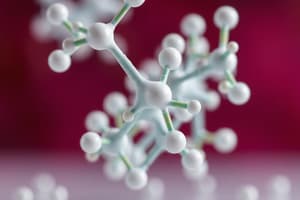Podcast
Questions and Answers
What is the primary role of ocular antihistamine drops?
What is the primary role of ocular antihistamine drops?
- To treat nasal congestion
- To provide long-lasting relief for all allergy symptoms
- To alleviate symptoms of allergic conjunctivitis (correct)
- To reduce itching and sneezing
Which nasal treatment is considered the most effective single therapy for allergic rhinitis?
Which nasal treatment is considered the most effective single therapy for allergic rhinitis?
- Oral antihistamines
- Ocular antihistamines
- Nasal corticosteroids (correct)
- Nasal decongestants
What symptom can indicate a need for nasal antihistamines?
What symptom can indicate a need for nasal antihistamines?
- Nasal obstruction (correct)
- Post-nasal drainage
- Throat irritation
- Itchy eyes
Which of the following allergens is associated with an increased risk of asthma development in children?
Which of the following allergens is associated with an increased risk of asthma development in children?
What is indicated by 'cobblestoning' in the posterior pharynx?
What is indicated by 'cobblestoning' in the posterior pharynx?
What is a notable effect of oral antihistamines compared to nasal treatments?
What is a notable effect of oral antihistamines compared to nasal treatments?
What causes the transverse crease across the nose observed in allergy sufferers?
What causes the transverse crease across the nose observed in allergy sufferers?
What is the expected peak age range for allergy symptom development?
What is the expected peak age range for allergy symptom development?
What is the main purpose of a skin prick test?
What is the main purpose of a skin prick test?
What is a significant potential consequence of using nasal decongestants as monotherapy?
What is a significant potential consequence of using nasal decongestants as monotherapy?
Which treatment approach is recommended when stopping nasal decongestants?
Which treatment approach is recommended when stopping nasal decongestants?
What typically occurs after the cessation of oxymetazoline when used alone?
What typically occurs after the cessation of oxymetazoline when used alone?
What does a positive skin prick test indicate?
What does a positive skin prick test indicate?
Why should nasal decongestant sprays not be used for extended periods?
Why should nasal decongestant sprays not be used for extended periods?
What does serum IgE testing primarily assess?
What does serum IgE testing primarily assess?
What is often advised in conjunction with nasal decongestants to optimize treatment efficacy?
What is often advised in conjunction with nasal decongestants to optimize treatment efficacy?
What is the primary use of pseudoephedrine in treatment?
What is the primary use of pseudoephedrine in treatment?
Which medication is most effective for managing profuse rhinorrhea?
Which medication is most effective for managing profuse rhinorrhea?
What type of rhinitis is characterized by persistent symptoms throughout the year?
What type of rhinitis is characterized by persistent symptoms throughout the year?
In immunotherapy, what is the main purpose of gradually administering allergens over several years?
In immunotherapy, what is the main purpose of gradually administering allergens over several years?
Which of the following treatments is NOT effective for non-allergic rhinitis?
Which of the following treatments is NOT effective for non-allergic rhinitis?
What is the typical treatment recommendation for patients with nasal polyps?
What is the typical treatment recommendation for patients with nasal polyps?
Which medication can be combined with a second-generation antihistamine in a single pill?
Which medication can be combined with a second-generation antihistamine in a single pill?
What is the risk associated with subcutaneous and sublingual immunotherapy?
What is the risk associated with subcutaneous and sublingual immunotherapy?
Samter's triad is characterized by the presence of which three conditions?
Samter's triad is characterized by the presence of which three conditions?
Which of the following is the first line treatment for non-allergic rhinitis?
Which of the following is the first line treatment for non-allergic rhinitis?
Study Notes
Oral Decongestant
- Supplement for nasal congestion
- Available over-the-counter
- Can be combined with second-generation antihistamines, for example, Claritin D.
- Multiple adverse effects
Montelukast
- Useful for patients with asthma
Cromolyn Sodium Intranasal Spray
- Take 4 times per day
- Can be taken throughout allergy season
Ipratropium Bromide
- Effective for managing profuse rhinorrhoea
Immunotherapy
- Administered by an allergist or immunologist
- Subcutaneous and sublingual immunotherapy
- Prevents the progression of asthma in children
- Requires weekly administration of minute allergen amounts for 2-3 years
- Dosing is gradually increased over 2-3 years to desensitize the immune system
- Customized based on allergy testing results
- Small risk of anaphylaxis
Non-Allergic Rhinitis
- Absence of allergic findings and post-nasal drip
- Symptoms often worse during winter months
- First-line treatment: Intranasal glucocorticoids + intranasal antihistamine
- Oral antihistamines are unhelpful
- Nasal ipratropium bromide is effective for managing rhinorrhoea
Nasal Polyps
- Benign, pedunculated tumors of the nasal mucosa
- Caused by chronically inflamed nasal mucosa
- Symptoms include: anosmia, nasal passage obstruction, hypo-nasal speech, mouth breathing
- Associated with Samter’s Triad: nasal polyps, aspirin sensitivity, asthma
- Often a sign of underlying nasal mucosal inflammation
- Manage underlying nasal mucosal inflammation with oral steroid, short-course if total nasal obstruction due to polyp
- ENT referral for surgical removal if total nasal obstruction
- Anterior rhinoscopy shows inflamed nasal mucosa and a polyp that resembles a peeled grape
Kawasaki Disease
- Rare, but significant immune dysfunction
- Repeated exposure to triggers like pollens, dust mite feces, animal dander, cockroaches, can lead to a release of histamine
- Characterized by fever > 101.3 degrees for five or more days
- Cardiac imaging is necessary
- Managed with antihistamine therapy: nasal antihistamines for "on-demand" use, azelastine spray for nasal congestion, ocular antihistamine drops for allergic conjunctivitis, oral antihistamine for itching, sneezing, rhinorrhea
Allergy Testing
- Skin prick test (most common) - positive result is a "wheal and flare"
- Serum IgE testing - no risk of anaphylaxis
Nasal Symptoms
- Transverse crease across the nose due to the "allergic salute"
- Rhinoscopy shows pale, boggy, blue-tinged nasal mucosa and clear nasal discharge
Allergic Rhinitis Treatment
- Nasal corticosteroids are the most effective single therapy for allergic rhinitis
- First-line treatment: Fluticasone (Flonase), Triamcinolone (Nasacort)
- More effective for nasal symptoms than oral antihistamines
- Provides relief for eye symptoms as well
- Takes several days for maximum effect
Decongestants
- Nasal decongestants are effective for nasal congestion
- Examples: Oxymetazoline
- Should be combined with nasal steroid (not monotherapy)
- Rhinitis medicamentosa: severe rebound nasal congestion following cessation of nasal decongestant spray as monotherapy
- Treatment: Start nasal glucocorticoid and gradually withdraw nasal decongestant
Studying That Suits You
Use AI to generate personalized quizzes and flashcards to suit your learning preferences.
Related Documents
Description
Test your knowledge on the pharmacological treatments for nasal congestion and related conditions. This quiz covers oral decongestants, montelukast, intranasal sprays, immunotherapy, and non-allergic rhinitis. Review the indications, adverse effects, and treatment protocols involved.



